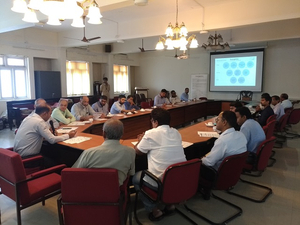This piece was originally published on ICLEI South Asia Secretariat’s website.
A stakeholder consultation meeting was organised in Panaji as part of the “EcoLogistics-Low Carbon Freight for Sustainable Cities” project on the 18th of December 2019. A first-of-its-kind global initiative, the project aims to prioritise strategies that will promote the transportation of goods with minimised impacts on air quality, noise, health, fatalities and injuries, besides traffic congestion and reduced GHG emissions.
In India, the project is being implemented in the cities of Kochi, Panaji and Shimla, and is supported by the German Federal Ministry for the Environment, Nature Conservation, and Nuclear Safety (BMU) through its International Climate Initiative (IKI) programme.
ICLEI South Asia presented an assessment of the current situation related to urban freight based on secondary sources as well as primary surveys undertaken in Panaji. The primary assessment included an understanding of the existing goods flow, freight traffic generation, major urban freight hotspots and infrastructure:
The assessment also highlighted important data gaps related to the urban freight baseline and the methodology that could help to overcome them. Once finalised, Panaji, along with Kochi and Shimla, would be among the pioneer cities in India to have a city-wide urban freight baseline and emission inventory. The urban freight baseline will be the basis for developing Low Carbon Action Plans for Urban Freight (LCAP-UF), which will define the GHG emissions reduction targets and corresponding actions, so as include a list of proposed demonstration projects.
The meeting was attended by over 20 relevant stakeholders and chaired by Mr Sanjit Rodrigues, Commissioner, Corporation of the City of Panaji. Among those who attended the meeting were senior representatives from the Traffic Police, Department of Civil Supplies and Consumer Affairs, Goa Investment Promotion and Facilitation Board, Department of Post, Goa Sahakar Bhandar (Junta House Branch), Goa State Co-op Marketing and Supply Federation Ltd, Goa Hotel and Restaurant Association, All Goa FMCG and Telecom Distributors Association, Panjim Municipal Market Tenants Association, Charles Correa Foundation and other private stakeholders.
The stakeholders appreciated and acknowledged the primary assessment, while providing valuable inputs to validate it, and agreed that “one of the common challenges city administrations face is lack of data related to urban freight”. They also discussed the priority action areas that could be included in the LCAP-UF for Panaji.



